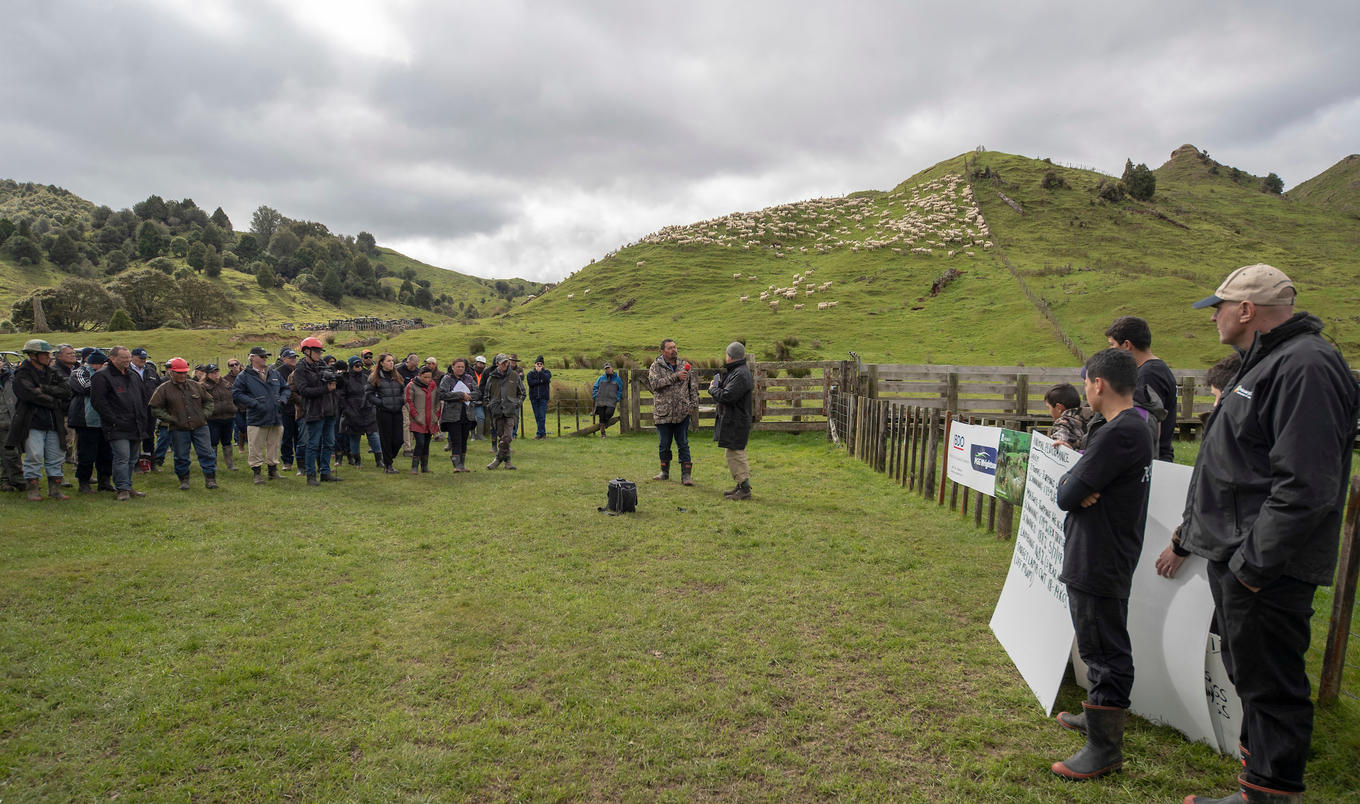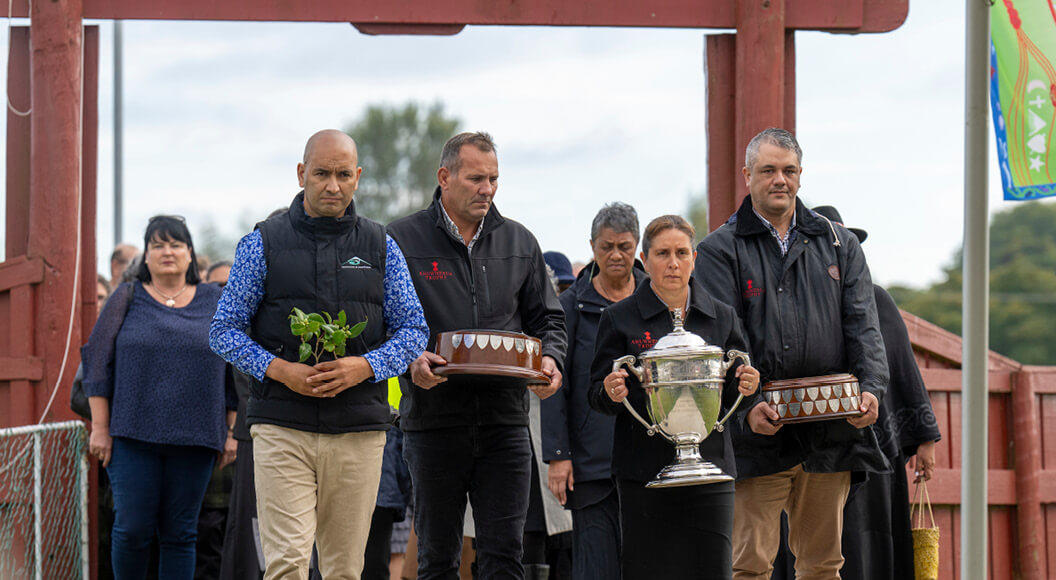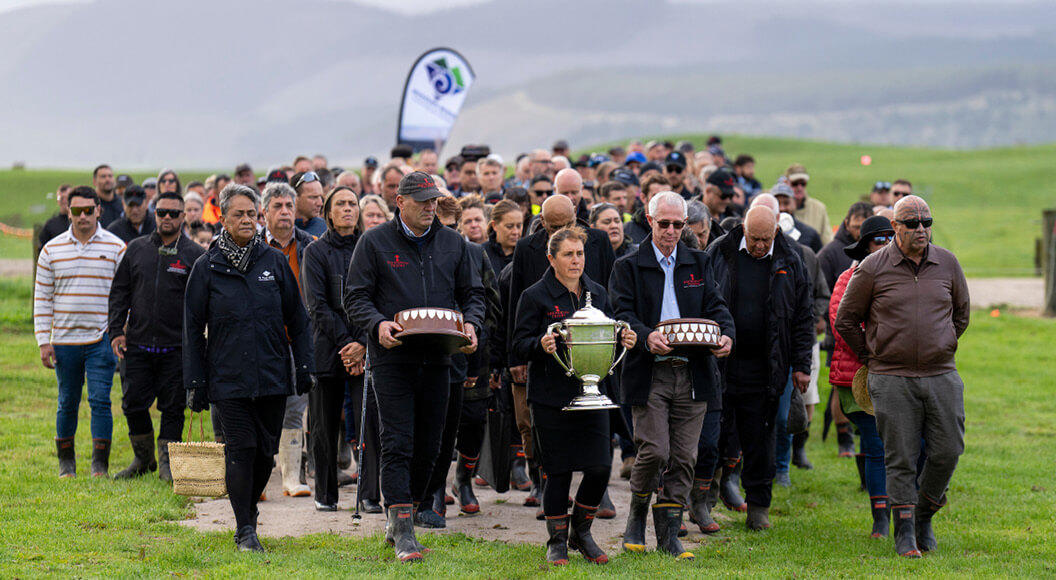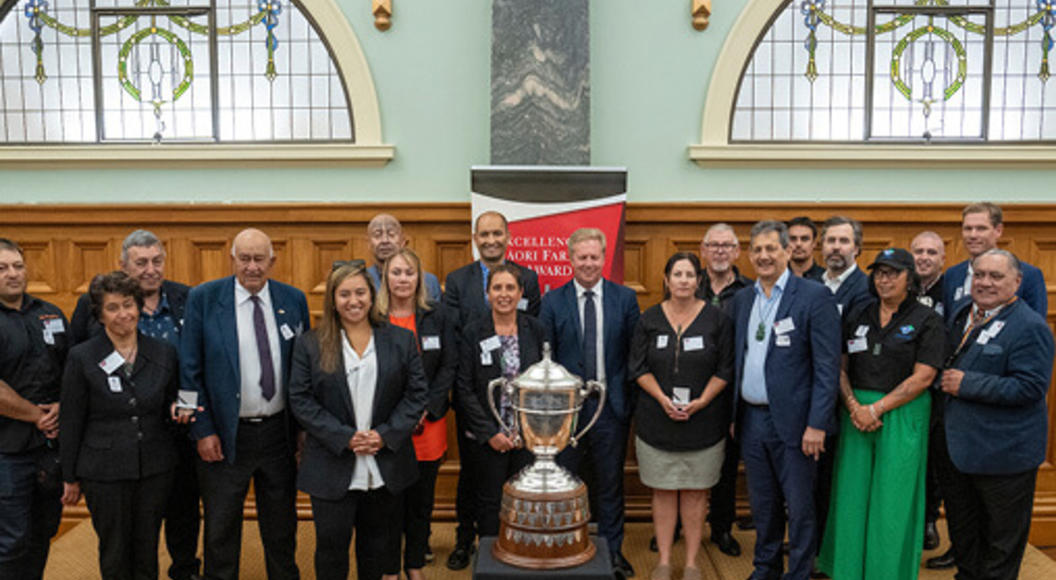
2022 Ahuwhenua Trophy Finalists Announced
The finalists in the 2022 Ahuwhenua Trophy competition for the top Māori sheep and beef farm have been announced. They are:
Onuku Māori Lands Trust, located at Rerewhakaaitu, Rotorua
Wi Pere Trust, located at Te Karaka, Gisborne
Hereheretau Station, located at Wairoa
The Ahuwhenua Trophy is the most prestigious award for excellence in Māori farming and was inaugurated 89 years ago by the great Māori Leader, Sir Apirana Ngata and the Governor General at the time, Lord Bledisloe. The objective was, and still is, to encourage Māori farmers to improve their land and their overall farming performance with an emphasis on sustainability. On a three-year rotational basis, the Trophy is competed for in the sheep and beef, horticulture and dairy sectors. This year the competition is for sheep and beef.
Nukuhia Hadfield, the Ahuwhenua Trophy Management Committee Chair says, “it is exciting to see the emergence of such high calibre finalists given the challenges that Māori farmers are facing.” She says the uncertainty created by the Covid-19 pandemic has added to the difficulties farmers have endured with severe adverse weather events, labour shortages in the sector and a whole raft of new regulations.
“This year’s finalists, along with the other entrants in this competition show the strength and determination of Māori farmers to successfully overcome adversity and get on with the daily task of farming in a truly sustainable way. Their contribution to the economic success of Aotearoa is not widely known or recognised. The aim of the Ahuwhenua Trophy competition is to follow the vision of Sir Apirana Ngata and Lord Bledisloe by changing this narrative and showcasing our success to the wider public,” she says.
Nukuhia Hadfield says despite the delays in getting this year’s competition underway because of the pandemic, the Ahuwhenua Trophy team and their supporters and sponsors are looking forward to seeing the farms of the finalists at their respective field days and also enjoying the awards dinner which is an occasion not to miss.
Field days will be held at the farms during August and September. These are open to the public and provide an opportunity for the finalists to showcase their properties. Media, along with members of the public are most welcome to attend.
Field day dates:
Thursday 25 August 2022 – Onuku Māori Lands Trust
Thursday 1 September 2022 – Wi Pere Trust
Thursday 8 September 2022 – Hereheretau Station
The winner will be announced at the awards dinner on Friday 21 October 2022 at the Pettigrew Green Arena in Taradale, Hawke’s Bay.
FARM PROFILES
Onuku Māori Lands Trust
Rerewhakaaitu, Rotorua
Ko Ruawahia te maunga
Ko Onuku kei te putake
Ko Rotomahana te moana
Ko Rangiaohia te whare tupuna
Ko Ngati Rangitihi te iwi
Ko Te Arawa te waka
Ko Mokonuiarangi te tangata
In 1882 the land now known as the Onuku Māori Lands Trust was partitioned and handed back to Ngati Rangitihi. The Mount Tarawera eruption occurred on the 10th June 1886, wiping out the Rangitihi Pa located at Moura on the shores of Tarawera, and the world famous Pink and White Terraces on the shores of Rotomahana. The surrounding land, including that of Onuku, was covered with Rotomahana mud and portions of Tarawera ash and gravel. These soils make up the base of the Onuku Farms today. The estate stretches from Mount Tarawera in the north to Timberlands boundary in the south across State Highway 38.
From 1963 the land was developed and managed by the Department of Lands and Survey and handed back to Ngati Rangitihi in 1982 when the Onuku Māori Lands Trust was formed. It had been run as one big drystock farming operation, but one of the goals of the Trust was to diversify and dairy was a good choice. Today the Trust has developed to consist of four dairy farms – three bovine and one ovine, a drystock farm, forestry, natural reserves and a manuka plantation. Onuku has also developed outside the farm gates, starting an export honey business: Onuku Honey.
One of the strategic goals of Onuku has always been to acquire land on its boundaries and in 2004 the Trust acquired a farm in Northern Boundary Road. Onuku is proud that this farm won the 2018 Ahuwhenua Trophy award for Dairy.
The farm has a strong environmental focus, with Onuku being part of Project Rerewhakaaitu, a voluntary local farming initiative to help protect local waterways and lakes. Management focus on reduction in N and P loss and the highest possible animal welfare standards. The Trust is currently part of a Jobs for Nature three-year project to restore the wetland area and carry out more planting and pest control.
The more recent strategy for Onuku is the move from sharemilking to herd ownership and the Trust now owns herds on all its bovine dairy farms. It has also been a leader in the sheep dairy industry and is mentoring other Māori farms looking to enter this industry.
Another strategy is for Onuku owners to be employed on farm and the Trust endeavours to implement this whenever possible.
The Onuku board is actively involved with the various areas of its business, particularly on farm where they visit regularly.
Contact: Angela Wharekura, 027 483 0350, [email protected]
Wi Pere Trust
Te Karaka, Gisborne
Created in 1899 by an Act of Parliament, the Wi Pere Trust was established by their tīpuna Wi Pere to protect the remaining lands of their whanau at a time when the whenua was heavily in debt, from being sold under mortgagee sale. It was a time of great turmoil regarding the retention of Māori land and throughout his lifetime and as a MP for Eastern Māori from 1884-1887 and 1894-1905, Wi Pere championed the retention of Māori land to be controlled and developed by Māori. Wi Pere was also responsible for forming the first Māori Incorporation, Mangatu Incorporation through the 1893 Mangatu Empowering Act.
Today, 123 years later, the Wi Pere Trust continues to thrive under the stewardship of his mokopuna, Alan Haronga (Chair), Kingi Smiler, Trudy Meredith, Hector Pere and Jason Lardelli. Their vision, which guides their strategic decisions is to nurture the Wi Pere legacy for current and future generations with the overarching philosophy of kaitiakitanga.
The Trust continues today as a statutory trust which was amended in 2017 to modernise the Trust constitution and to remove the power of the Minister for Māori Development to appoint Trustees. Trustees are now appointed by the 550 owners who represent a wider whanau base who whakapapa to Te Aitanga a Mahaki and Te Whanau a Kai.
Located in Gisborne, Wi Pere Farms consists of 6,770ha with 4,900 effective ha, which consist of two blocks, Otara at Whatatutu and Tangihanga at Waituhi. The land blocks carry 51,000 stock units comprising 32,400 sheep and 4600 cattle. The farm is managed by General Manager Tim Rhodes, with fifteen full-time staff. Wi Pere Farms are classified as North Island steep hard hill country.
The Trust have developed comprehensive Land Environment Plans to guide how to best utilise the land including the retirement of erosion prone land, fencing all waterways approximately 35 kilometres, riparian planting and improving water quality. Wi Pere produces approximately 1,100,000kg of meat and fibre annually and optimises product returns by selling via a Māori Collective Cluster, Awhina to the Alliance Group.
Community activities include supporting Te Rongopai Marae at Waituhi which is considered unique as one of the few painted meeting houses in Aotearoa.
The Chairman of the Trust has taken an active leadership role with the Tairawhiti Whenua Group representing approximately 42 land blocks covering 143,000ha of Māori land, who are engaging with local and central government on freshwater reforms and climate change.
All these activities are vital in achieving our long term sustainable, environmental, social and financial goals.
Contact: Tim Rhodes, 027 272 5421, [email protected]
Hereheretau Station
Wairoa
Hereheretau Station, a 2,000ha sheep and beef farm near Wairoa, is the major asset of the Māori Soldiers Trust.
The Māori Soldiers Fund was set up in 1917 as part of the efforts of Sir Āpirana Ngata among others. The fund was started with 3,800 pounds in koha for the benefit of Māori veterans of the First World War. Over time additional donations were made contributing to leasehold interests of farmland in the northern parts of Wairoa. In 1922, the lease of two Hereheretau blocks was agreed.
In 1925, the Māori Soldiers Fund purchased Hereheretau Station and the asset was vested in the Māori Trustee. The Māori Soldiers Trust Act 1957 formally established the Māori Soldiers Trust and sets out its purpose, powers and administration by the Māori Trustee.
Earnings from Hereheretau Station are transferred into the Māori Soldiers Trust Scholarship Account for distribution as part of the Sir Āpirana Ngata Memorial Scholarship programme. These scholarships are granted to Māori for higher education. In 2021, 70 successful recipients received scholarships ranging from $1,000-$3,000.
A key function of the Māori Soldiers Trust Committee is to determine how much money is made available each year for these scholarships. The Trust Committee includes the Minister for Māori Development (as Chair); the Māori Trustee (as Deputy Chair); and Māori Soldiers, who have served overseas, and who represent one of the Māori Land Court districts.
Hereheretau Station is coming to the end of an extensive capex programme and is in a strong financial position to increase its contributions to aspiring young Māori through the Māori Soldiers Fund scholarships.
Embracing the local community at Whakakī, Hereheretau Station, is proactively involved in local projects, such as the restoration and protection of the Whakakī Lagoon, working alongside the local marae where possible, and supporting the local primary school in various capacities.
Today Hereheretau Station farms 122 land titles, many of which are Māori owned and under various agreements. Once inside the Hereheretau Station farming operation, best practice is implemented across the whenua with environmental wellbeing and appropriate land use at the forefront of decision making.
Hereheretau Station employs six full time staff, with a progressive shepherd growth programme that echoes the purpose of the Māori Soldiers Trust.
Governance structure and reporting are key to Hereheretau Station’s ability to make sound and timely decisions as a commercial entity.
Key facts
- 3,480 hectares managed
- 2,687 hectares effective
- Contour ranges from flat to steep hill country
- Average annual rainfall ranges from 1,000mm on the coastal flats to 2,000mm in the back hills
- 25,000 stock units
- 55:45 sheep to cattle ratio
Sheep
- 8,600 MA ewes lambing (including 2ths)
- Top 1,000 hoggets lambing
- All progeny sold prime, plus winter trade 4,000-5,000 lambs as able
- Average lamb CW over 20kg
Cattle
- 530 MA cows calving, 170 first calvers
- All progeny finished prime
- 400 12–15-month steers purchased and sold prime
- Steers average over 300kgCW
- Heifers over 260kgCW
Contact: Sam Vivian-Greer, 027 235 9481, [email protected]
History of the Ahuwhenua Trophy
It is now 89 years since the Ahuwhenua Trophy was inaugurated by the visionary Māori leader Sir Apirana Ngata and the Governor General at the time Lord Bledisloe. What is quite remarkable is that this competition remains as relevant and as prestigious now as it was almost a century ago.
While the values and vision of Sir Apirana and Lord Bledisloe have remained unchanged, the way the competition is run has moved with the times – especially since its re-launch in 2003.
The Ahuwhenua Trophy competition was introduced to encourage skill and proficiency in Māori farming. Sir Apirana Ngata realised the importance of retaining and improving what remained of Māori land was critical. He led the renaissance of Māori land development which had been decimated during the colonisation of New Zealand by forced sales and lack of opportunity and access to development capital.
The inaugural 1933 competition was open to individual dairy farmers in the Waiariki Land district and was won by William Swinton from Raukokore, Bay of Plenty. The following year the competition was extended to include entrants from North and South Auckland, Gisborne, Whanganui, and Wellington.
In 1936 the cup was won by Henry Dewes, a sheep farmer from Tikitiki. The Trophy was displayed in the Waiapu Farmers store which two weeks later caught fire and destroyed the cup. It was replaced with a new cup in 1938 but six years later that trophy was lost during a rail trip from Rotorua to Wellington. It was eventually found in 1946 in a Frankton store after being mislaid with someone’s personal belongings at the railway station.
The inappropriateness of comparing dairy with sheep and beef farms became increasingly evident and in 1954 the competition was divided into two separate awards, each with their own trophy. Once again, Lord Bledisloe, a man with farming interests donated the companion cup.
The competition continued up until the 1980s but interest started to wane and the last of the original competitions was held in 1990. It was Gina Rudland and Wayne Walden who along with Meat New Zealand chairman John Acland re-launched the awards in 2003. The awards took into account the changing face of Māori farming and the increasing importance of Māori Incorporations and Trusts in the agribusiness sector.
In 2005, the Ahuwhenua Trophy Management Committee decided on a new structure for the competition with sheep and beef and dairy competitions being run in alternate years. In recognition of Māori involvement in the horticultural sector, it was decided that in 2020, the competition would be opened up to also include horticulture. A new trophy was designed and made and there was excellent support for this initiative.
The Ahuwhenua Trophy competition Trustees are the Minister for Māori Development, the Minister of Agriculture, and the Secretary for Māori Development. They delegate their authority to the Ahuwhenua Trophy Management Committee to manage and supervise the competition. The current Chair, Nukuhia Hadfield, has held this position since July 2021.
The first bi-annual dairy competition held in 2006 was won by the Parininihi ki Waitotara (PKW) Incorporation’s Farm 12 in Taranaki under the chairmanship of Spencer Carr and Secretary Peter Charleton. Previous Chairmen of PKW Edward Tamati and Charles Bailey were dual winners of the Trophy as individual farmers in 1965 and 1971, 1970 and 1976 respectively.
An award for young Māori farmers was introduced in 2012 and successive winners have demonstrated that young Māori have the leadership and management skills to take Māori agribusiness forward in the 21st century. Māori success is centred around the need to provide for future generations and so this competition is about ‘future proofing’ Māori businesses.
Today the Ahuwhenua Trophy remains the pre-eminent accolade to win in Māori farming and is recognised as the most prestigious and comprehensively judged award in New Zealand. The entrants, finalists and eventual winners all share and live the enduring values, goals, and vision of Sir Apirana Ngata and the competitive spirit of Lord Bledisloe.
A special book, ‘Ahuwhenua – Celebrating 80 years of Māori Farming’ was launched by the then Minister of Māori Affairs, Hon Dr Pita Sharples in 2013. It was written by the eminent historian Dr Danny Keenan and traces the history of the Award and gives a brilliant insight into the development of Māori farming over 80 years. This book shows just how much Māori farming has developed over the years and how the Ahuwhenua Trophy has established a strong platform for the future growth.
See more on Ahuwhenua here


